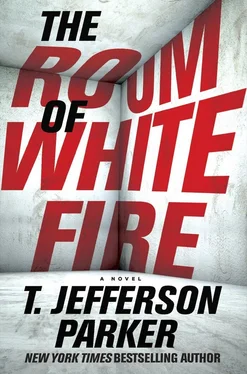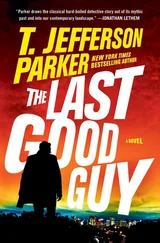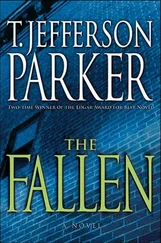Half a mile down the road I saw the heavy old guard come from the booth, look down at the broken barrier lying in the grass, then go back inside. “Has Clay ever complained to you about his treatment there?”
Mr. and Mrs. Hickman exchanged looks. “All we know is he was stable,” said Rex. “Then this.”
“Why did he come here today?” I asked.
“Because we’re his parents and we love him?” Rex asked.
My turn to ask the obvious. “If you love him, then why don’t you see him more than once a year?”
Rex colored, then drank. Patricia turned her back to us and looked out a big window. I hadn’t wanted to bring that up yet, but their armor was hard and I needed something strong to get through it.
“He loves us,” Patricia said to the glass. “But few and brief visits are all he can stand of us. He experiences terrible anxiety when we visit. Once, he chewed himself like a dog, the day before we were to see him.”
“So we stay away,” said Rex. “Even the once-a-year is... difficult.”
“Why?”
Rex set his drink on an end table, put an arm around his wife. They were the same height. When they whispered it sounded like the same whisper. Questions and answers. I had the feeling that they were saying things they had said many times. Had the feeling that Patricia was winning this negotiation. They turned to me together.
“Clay was born with a bad heart,” she said. “And they said he might not live. There were complications over the years, but he wanted to be strong, like his sisters. So he compensated. He compensated so hard you wouldn’t believe it. There was never a boy who worked harder to be strong and smart. He read and read, and studied and studied, got tutors, always took the hardest classes. He ran for miles and lifted weights and played sports and went to summer school, and there was never one day of his life that Clay wasn’t striving and straining and sweating to be stronger and smarter and better. He—”
“Overcompensated, is what Pat’s trying to say.” Rex cleared his throat. “I did some of that myself. When I was young. Winning became everything to him — beating Kayla and Daphne. But the war changed him. He felt he had lost. He thought he’d let us down somehow. Then came all this crazy behavior. Seeing us now reminds him of his failure, of how far he has fallen. So he doesn’t want to see us.”
“He was set for Stanford but he joined the Air Force instead,” said Patricia.
“Nine-eleven,” said Rex. “He was only thirteen, but the attacks fit right into his mental picture of becoming Superman. For his country.”
“He was one of the best aircraft mechanics in Iraq, wasn’t he, Rex?”
Rex held my stare. “Ali Air Base. He worked on the Spookies.”
“So,” said Patricia. “That’s why we can’t see him as much as we’d like. It’s a sacrifice we make for him. If he was more comfortable around us, I’d move him into this house, get the security better and plenty of nurses, and maybe—”
“Enough, Pat. This is ground we have agreed not to walk upon.”
She nodded, resigned.
“Believe me,” said Rex. “We’d be at Arcadia once a week.”
At the bar Rex freshened his drink, then refilled his wife’s wineglass and brought it to her. “I’d offer you a drink, but it’s late.”
I checked my watch to confirm it was only four in the afternoon, but let that slide. “Less than an hour ago there was gunfire here, directed at your son and an innocent girl. Now I show up, trying to get Clay back to his hospital, and you want to kick me down the road. Why?”
Hickman gave me a cold stare but no information. I rolled with his silence and turned to his wife. “Mrs. Hickman, were you looking forward to your annual visit with Clay next week?”
“Get out,” said Rex.
Patricia Hickman smiled. “Very much, Mr. Ford. I’ve purchased a new Max Azria for the occasion.”
He gave her a tough glance. “Dear? Please shut up. Beat it, Ford. The Ventura sheriffs can get here in a hurry.” Rex jammed a hand into his shorts pocket and drew his phone.
“Just a couple of things, Mr. Hickman, then I’ll leave you to your busy evening. Did you have any contact with Clay in 2008 or 2009?”
“Why, of course,” said Patricia. “We talked three or four times a week when he was overseas.”
“Did he ever send you anything physical, a letter or a postcard or a package? A gift, maybe? Not electronic, but something with an origin?”
Patricia seemed guileless and Rex overheated and I didn’t think they were lying to me about Clay being at Ali Air Base. They’d fallen for the same invented war story that Paige Hulet had given me. “Clay only got us one gift from the war,” said Patricia. “But he didn’t mail it. He brought it home in his duffel.”
“What was it?” I asked.
“Pat? Stop.”
“It’s okay, Rexie. Dolls, Mr. Ford. Two dolls, fighting with swords. Villagers of some kind. Soft, with ceramic faces. Less than half a foot tall. Clay thought we would like them. We kept them upstairs in his room.”
“Christ, Pat.”
She looked at him, then down at the floor. “The dolls were genuine folk art, and they showed us he cared. Honey, Mr. Ford really should know that the longer Clay was at war, the less we heard from him. And how, by the last year of his deployment, we were down to maybe an email or text every other week. Or once a month.”
“It’s none of his business how much our son did or did not write us,” said Rex.
A heavy silence settled over the room. I felt very grateful that I was not either one of these human beings. “When Clay first saw Arcadia, what did he think of the place?”
“Clay liked it,” Rex said. “He wanted to live there. But we didn’t discover it — it discovered us. People like Briggs Spencer look out for people like me. Now, excuse me while I call 911 to report your invasion of my home.”
“What did Clay want today? Why did he come here?”
Hickman looked up from his phone with all the menace he could find. It might have been terrifying from across a boardroom table. I did not laugh in his face. It always surprises me how successful in life angry, small-minded people can be. I must underestimate these virtues.
“He wanted the fighting dolls I just told you about, Mr. Ford,” said Patricia. “And he took them.”
I paused and considered. “After three years in a private hospital, he dug out and came all the way up here to retrieve two folk dolls that he’d brought home from the war. Can you make some sense of that for me?”
“He also needed money,” said Patricia. “So he took five thousand from our what-if jar.”
“Damn it, Pat!”
“We’re as puzzled as you must be,” she said. “But Clay gave us something back. He gave each of us a big strong hug. For the first time in years. My heart felt so full and light. But then he took the gun from Rexie’s nightstand. It’s loaded. He seemed so eager to have the gun. Which frightened both of us half to death.”
I felt a jagged surge of adrenaline. Now the violent schizoaffective Clay Hickman was armed, financed, and shielding himself with a nineteen-year-old girl who thought she’d found a friend in him. He had risked her life just an hour ago. He was off his meds and in the wind again and his stolen firearm was loaded.
“Clay needs to be stopped,” I said. I set a business card on an end table. “He’s crazy, off his meds, and dangerous. Neither of you see how wrong that could have gone.”
Rex tried to stare me down again but his fighting spirit had flown. He slipped the phone back into his pocket. “I want to get one thing straight before you get off my property.”
“Straighten away.”
Читать дальше












